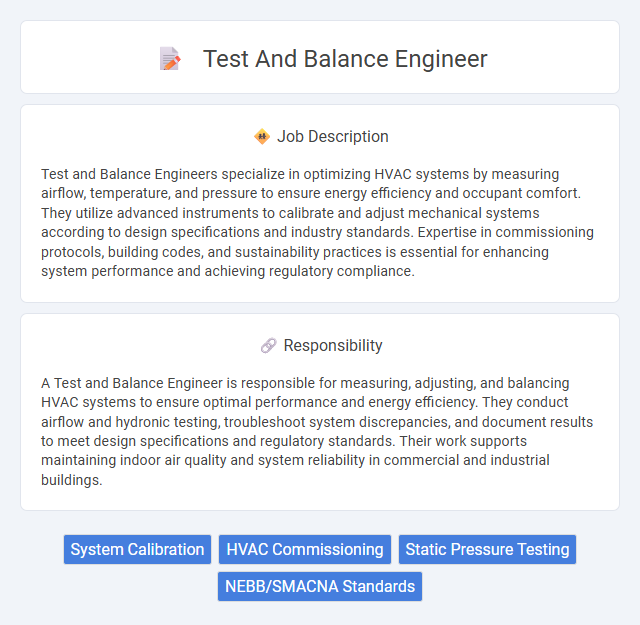
Test and Balance Engineers specialize in optimizing HVAC systems by measuring airflow, temperature, and pressure to ensure energy efficiency and occupant comfort. They utilize advanced instruments to calibrate and adjust mechanical systems according to design specifications and industry standards. Expertise in commissioning protocols, building codes, and sustainability practices is essential for enhancing system performance and achieving regulatory compliance.
Individuals with strong analytical skills, attention to detail, and a background in mechanical or HVAC engineering are likely suited for a Test and Balance Engineer role. Those comfortable working in dynamic environments requiring precise measurement and adjustment of air and water systems may find this position fulfilling. Candidates who prefer routine tasks or have limited technical proficiency might face challenges adapting to the demands of this job.
Qualification
Test and Balance Engineers typically require a bachelor's degree in mechanical engineering, electrical engineering, or a related field, complemented by professional certification such as NEBB or TABB. Proficiency in HVAC systems, airflow measurement, and building commissioning is essential for accurate system performance evaluation. Strong analytical skills, knowledge of industry standards, and experience with specialized testing equipment enhance the ability to optimize building environments for energy efficiency and occupant comfort.
Responsibility
A Test and Balance Engineer is responsible for measuring, adjusting, and balancing HVAC systems to ensure optimal performance and energy efficiency. They conduct airflow and hydronic testing, troubleshoot system discrepancies, and document results to meet design specifications and regulatory standards. Their work supports maintaining indoor air quality and system reliability in commercial and industrial buildings.
Benefit
Working as a Test and Balance Engineer likely offers the benefit of ensuring optimal performance and energy efficiency of HVAC systems, which may lead to cost savings for clients and improved environmental sustainability. Professionals in this role probably gain expertise in analyzing and adjusting system parameters to meet design specifications, enhancing their technical skills and career prospects. The job might also provide opportunities for collaboration across engineering and construction teams, fostering professional growth and diverse experience.
Challenge
Challenges faced by Test and Balance Engineers likely involve diagnosing complex HVAC system inefficiencies under tight project deadlines. They probably need to interpret intricate data and collaborate with multidisciplinary teams to ensure systems meet performance standards. Overcoming unpredictable environmental variables and technical discrepancies may demand adaptive problem-solving skills and precise analytical methods.
Career Advancement
Test and Balance Engineers specialize in measuring and optimizing HVAC system performance to ensure energy efficiency and compliance with building standards. Career advancement often leads to senior engineering roles, project management, or consulting positions within mechanical systems design and construction industries. Expertise in advanced diagnostic tools and regulatory codes enhances promotion opportunities and higher salary potentials.
Key Terms
System Calibration
Test and Balance Engineers specialize in the precise calibration of HVAC systems to ensure optimal airflow, temperature control, and energy efficiency. They utilize advanced instrumentation and measurement techniques to analyze performance data, adjust system parameters, and verify compliance with design specifications and industry standards. Accurate system calibration led by these engineers enhances indoor air quality, occupant comfort, and sustainable building operation.
HVAC Commissioning
Test and Balance Engineers specialize in HVAC commissioning to ensure optimal system performance by measuring and adjusting air and waterflows according to design specifications. They use precision instruments to verify ventilation, heating, cooling, and air quality standards, improving energy efficiency and system reliability. Expertise in building codes, ASHRAE standards, and commissioning protocols enables accurate diagnostics and comprehensive system optimization.
Static Pressure Testing
Test and Balance Engineers specializing in Static Pressure Testing ensure HVAC systems operate efficiently by accurately measuring and adjusting air pressure within ducts and ventilation units. They utilize manometers, pitot tubes, and pressure probes to identify pressure differentials, optimize airflow, and verify compliance with design specifications and ASHRAE standards. Precise static pressure testing is critical for achieving energy savings, maintaining indoor air quality, and extending equipment lifespan.
NEBB/SMACNA Standards
Test and Balance Engineers specialize in measuring and adjusting HVAC systems to meet NEBB and SMACNA standards, ensuring optimal air and water flow for energy efficiency and indoor air quality. They perform rigorous testing procedures such as airflow measurement, hydronic balancing, and system calibration according to industry benchmarks. Proficiency in NEBB certification and adherence to SMACNA guidelines guarantees system performance, compliance, and occupant comfort in commercial and industrial facilities.
 kuljobs.com
kuljobs.com